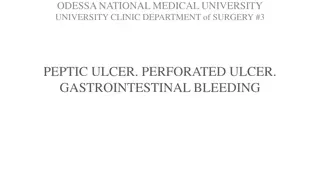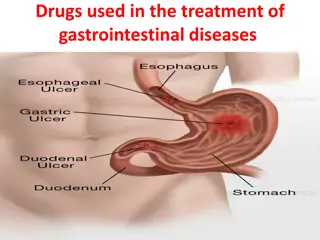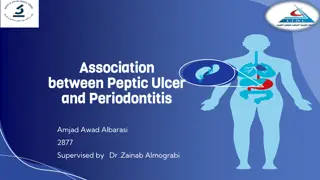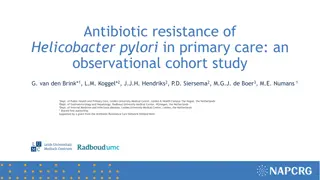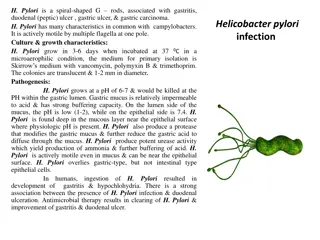Understanding Peptic Ulcer Disease: Causes, Symptoms, and Treatment
Peptic ulcer disease (PUD) involves ulcerations in the duodenal or gastric mucosa caused by factors like Helicobacter pylori infection and NSAID use. Symptoms include abdominal pain and nausea, and treatment often involves H. pylori eradication and proton pump inhibitors to prevent complications lik
1 views • 77 slides
Peptic Ulcer Disease: Treatment Approaches and Helicobacter pylori Eradication
Common gastrointestinal conditions such as peptic ulcers can be effectively treated through approaches like eradicating H. pylori infection, reducing gastric acid secretion, and using mucosal protecting agents. Helicobacter pylori eradication is crucial for healing ulcers and preventing recurrence,
0 views • 27 slides
Association Between Peptic Ulcer and Periodontitis: Insights and Connections
Previous studies have suggested a potential link between peptic ulcer disease (PUD) and periodontitis. PUD affects the gastrointestinal mucosa, with key risk factors being H. pylori infection and NSAID use, while periodontitis is an inflammatory disease affecting the tissues around teeth. Understand
0 views • 17 slides
Antibiotic Resistance of Helicobacter pylori in Primary Care: Observational Cohort Study
Research focused on Helicobacter pylori eradication success and antibiotic resistance development in primary care settings, revealing an 8% rate of treatment failure leading to a second treatment within 12 months. The study suggests a need to revise treatment guidelines, potentially targeting specif
0 views • 6 slides
Understanding Peptic Ulcer Disease and Dyspepsia: Causes and Pathogenesis
Peptic ulcer disease and dyspepsia are common gastrointestinal conditions. Dyspepsia presents with upper abdominal pain and may or may not be associated with peptic ulcers. The most prevalent causes of dyspepsia include non-ulcer dyspepsia, GERD, and peptic ulcers. Peptic ulcers account for a signif
0 views • 24 slides
Helicobacter Pylori: Characteristics, Pathogenesis, and Diagnosis
Helicobacter pylori is a spiral-shaped Gram-negative bacterium associated with various gastrointestinal conditions like gastritis, duodenal ulcers, gastric ulcers, and gastric carcinoma. It exhibits unique characteristics in common with Campylobacters and has specific culture and growth requirements
0 views • 5 slides
Understanding Peptic Ulcers: Causes, Symptoms, and Treatment
Peptic ulcers are open sores that form in the stomach or upper small intestine, leading to symptoms like stomach pain, bloating, and nausea. Common causes include H. pylori infection and NSAID use. Recognizing symptoms, such as burning stomach pain, is crucial for timely diagnosis and management. Se
0 views • 19 slides
Guiding H. pylori Infection: A Choose Your Own Adventure Journey
Can you navigate Helicobacter pylori to successfully infect a human host? Embark on an adventure to understand how H. pylori colonizes humans, starting from the stomach. Explore the intricate process through interactive choices and engaging activities. Discover the fascinating world of microbial inf
0 views • 25 slides
Understanding Peptic Ulcers: Causes, Prevalence, and Treatment
Peptic ulcers are circumscribed ulcerations in the gastrointestinal mucosa, commonly caused by Helicobacter pylori infection. They have a higher prevalence in developing countries and are associated with factors like socioeconomic status, poor hygiene, and genetic links. While peptic ulcers naturall
0 views • 54 slides
Understanding Antibiotics and Their Effects on Germs
Explore the world of antibiotics and their impact on bacteria, fungi, viruses, and mild bacterial infections. Delve into the chemistry of antibiotics, their mechanisms, and how they combat various germs. Learn about the treatments involving antibodies and specific conditions like Helicobacter pylori
0 views • 18 slides
Understanding Helicobacter pylori: Morphology, Pathogenesis, and Identification
In this detailed lecture, Assistant Professor Dr. Dalya Basil discusses the characteristics, identification methods, growth characteristics, and pathogenesis of Helicobacter pylori. This spiral-shaped, gram-negative rod bacterium is associated with various gastric conditions, including gastritis, ul
1 views • 23 slides
Asthma, GERD & Dyspepsia: Diagnosis and Management Scenarios
In this medical scenario-based content, we explore cases of bronchial asthma in an 8-year-old boy with symptoms frequency assessment, risk factors, and management strategies. Moving on to dyspepsia and GERD, we delve into diagnostic approaches for a 54-year-old male with H. pylori and a 57-year-old
0 views • 9 slides
